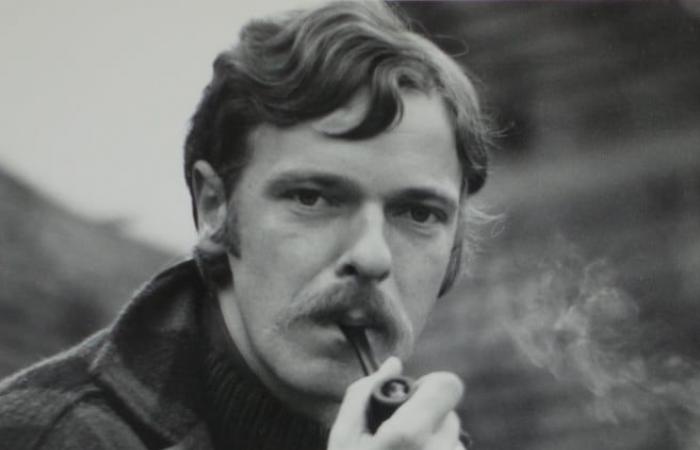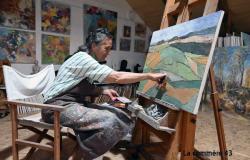This great collective oversight even affected Google, not so long ago, before Ariane Labrèche got involved. Now, by typing the artist’s name, you will find at least the journalist’s digital story – as well as her podcasts – among the few results offered.
This is the result of research spread over a year. During which Ariane Labrèche dug up memories, met many family members and obtained tons of never-before-seen archives.
Yves Albert appears here, in 1980, with his sons Loïc and Maximilien. (Courtesy of Yves Albert’s family)
Like a good story that one would have scripted for the cinema, this one began by chance, during a car ride. The Radio-Canada journalist was with her brother when Yves Albert’s voice, “so beautiful,” began to resonate on the radio.
“I was really moved. I said to myself, let’s see, that’s all well and good, who is this guy?” she says in an interview with The Daily.
So that means that there is at least one station in Quebec to play the music of the late artist from Limoilou, we might be tempted to conclude. But no, Ariane Labrèche stops us right away.
It’s only because his brother Charles is a real “trad tripper”, to the point of digitizing his best vinyl finds himself, that this song found its way to his ears.
And if this technique old school arouses in the journalist an obvious admiration for her brother, it also opens the door to several reflections. Concerning our musical heritage, our knowledge of it, and its accessibility, as of today.
Ariane Labrèche met several relatives and family members during her research, including Loïc Albert and Monique Lelièvre. (Radio-Canada)
“It shows to what extent the digitization of music has really not guaranteed the preservation of everything that exists. Especially in traditional music in Quebec, I want to say that there is a pretty good part of what has been done in the last 60 years that is not available on platforms.”
In fact, one could almost say that Yves Albert, like many of his contemporaries, would have needed an Yves Albert to ensure the longevity of his work. Because the main person concerned, who died at the age of 39 in a road accident on Route 175, saw himself as a “folklore duster”, building his repertoire by collecting songs at the source. Everywhere in Quebec, but very often in Chicoutimi and Gatineau, where he passed through more than once.
“He gave so much time and energy to preserve our heritage, and we don’t remember that. It’s nonsense,” laments Ariane Labrèche.
Ariane Labrèche’s research, carried out through other projects, will have been spread over a period of one year. (Denis Wong)
It is mainly these songs, written by others before him, that he offers on stage, between 1966 and 1981, the artist having never put his own compositions on disc. Despite archives which tend to show that they were well worth it.
By following the footsteps of his journey, Ariane Labrèche had the chance to discover several, to become familiar with the artist. But she was also able to know the man, through relatives. Like Monique Lelièvre – wife of the late singer-songwriter Sylvain Lelièvre. Or even Loïc Albert, Yves’ son, with whom she found her first answers. At the same time as the desire to look for the next ones.
“He himself had a lot of answers he didn’t know. Like how his parents met, what his father’s early career was like.”
— Ariane Labrèche
“That’s when I said to myself that there was something to do, that it might even allow his sons to know more about their father.”
Yves Albert’s career lasted around fifteen years, until his accidental death in 1981. (Courtesy of Yves Albert’s family)
More familiar than the average person with Yves Albert today, Ariane Labrèche describes a bohemian and endearing man in her report. She also recalls that he made more than one appearance on television, that he shared the stage with artists of the caliber of Gilles Vigneault, Edith Butler and the smiling Bottine. Then he recorded memorable albums.
“I have nothing but bravos to give to Yves Albert who has just produced an impeccable album, close to perfection, as close as that can be,” wrote the critic Yves Ouellet in The Daily of June 16, 1979, about his second opus.
One wonders what place Yves Albert could have occupied in the history of Quebec song, with a little more luck. (Courtesy of Yves Albert’s family)
But all these feats of arms were unable to protect him from the oblivion into which he fell, after his death in 1981. A death barely mentioned in the media, occurring in a park in the Laurentians, a few hours after a Saint-Jean-Baptiste Day show in Alma.
And an oversight that will have been almost complete, until Ariane Labrèche’s project. “There is a first step done, but the second would be to find a way for her music to be accessible to the general public.
«[…] I have rarely done a project that resonated so much. I received so many comments, both from people who knew him and from younger people who just found what he was doing incredible. It’s beautiful to see that.”
For Ariane Labrèche’s full report, click here. And for the podcasts, click here.






